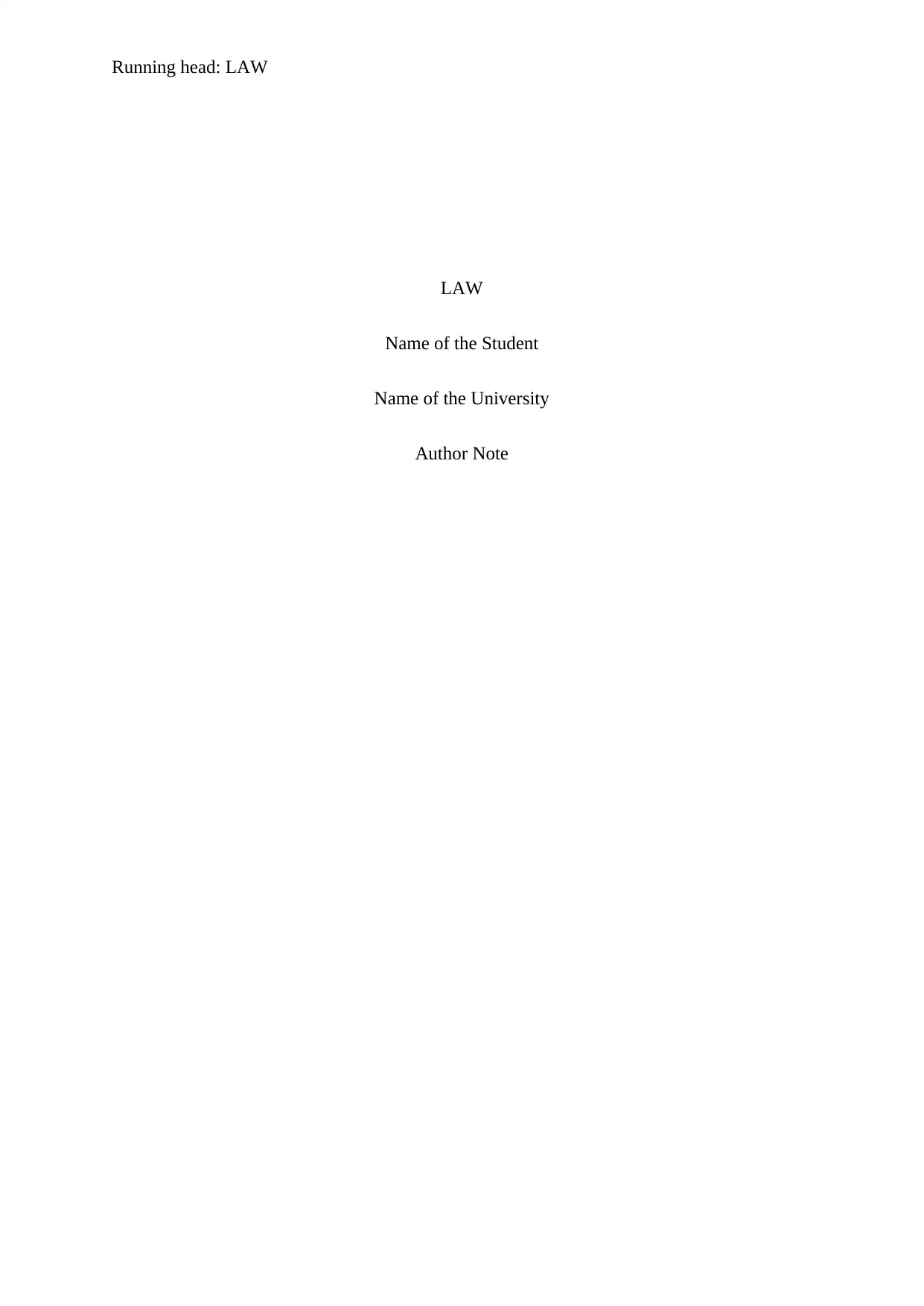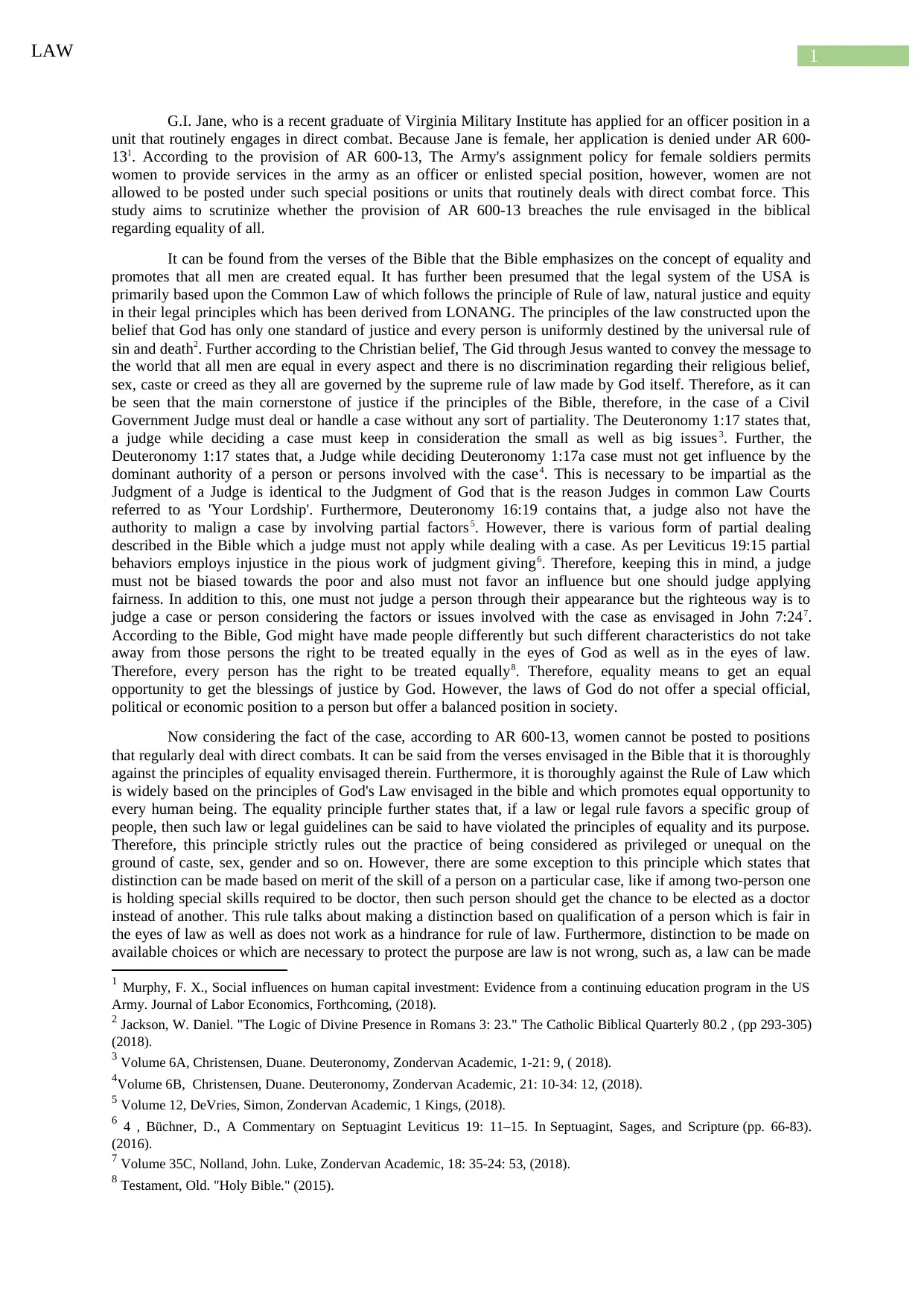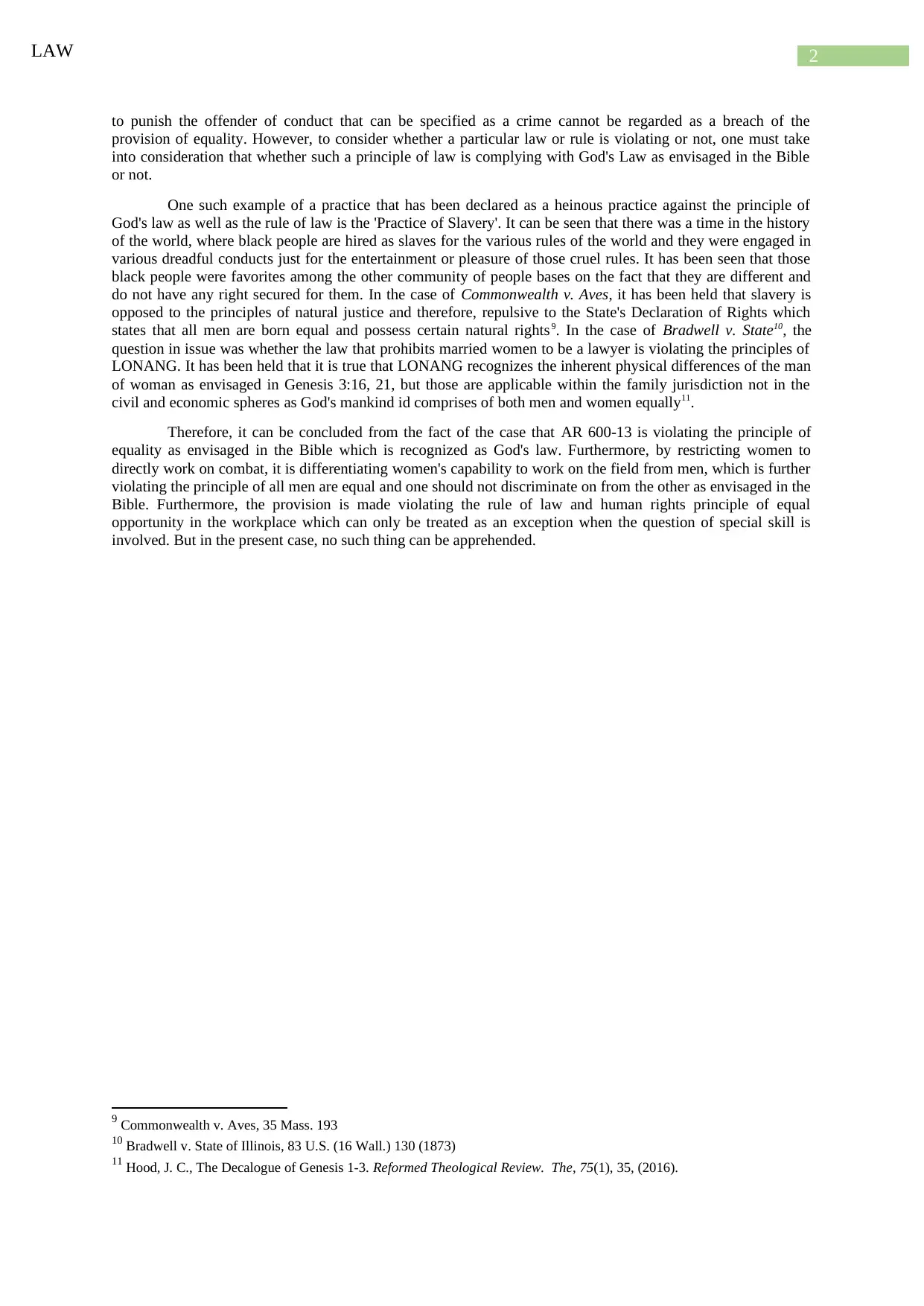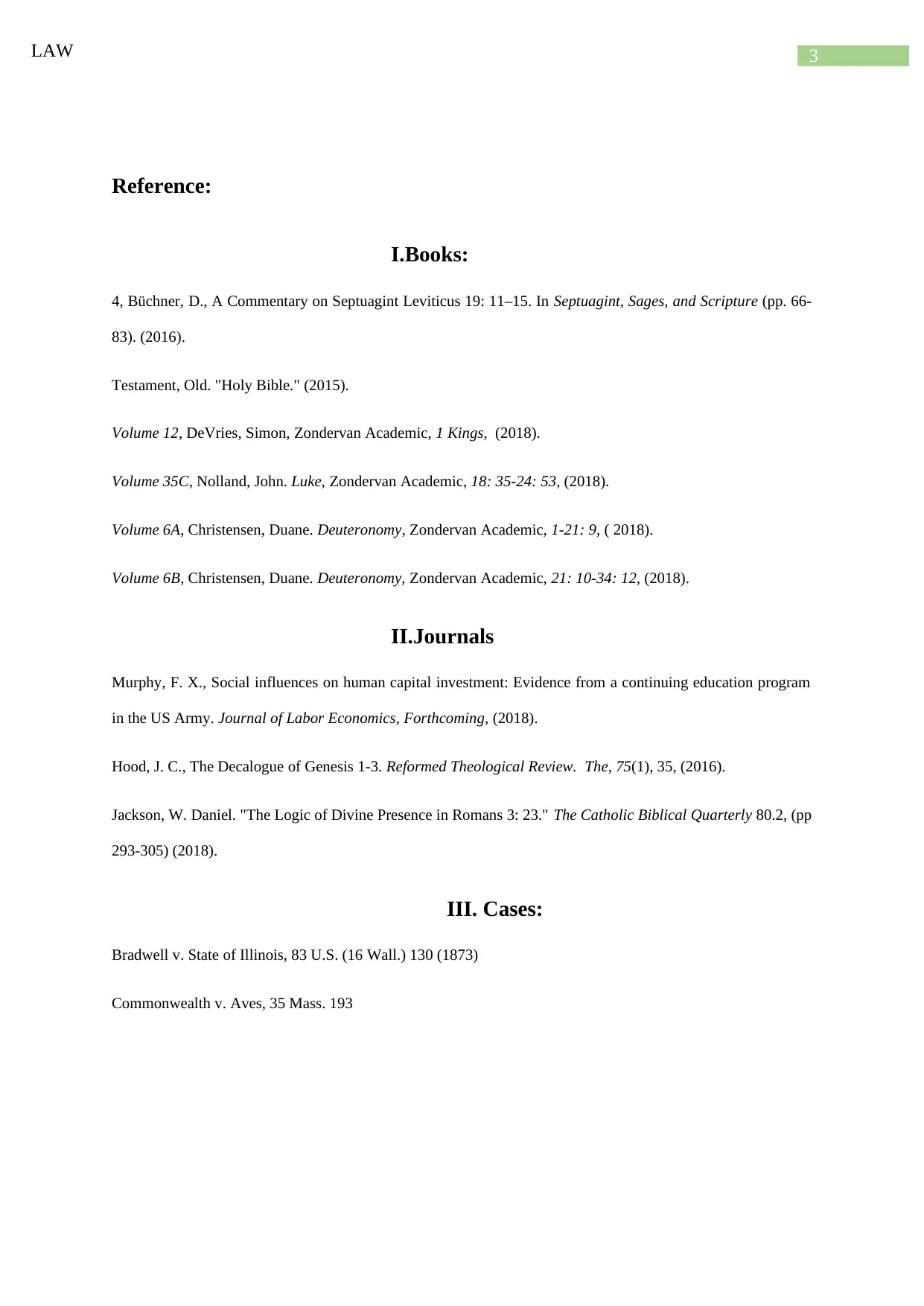The Principle of Equality in Law and Military Service: An Essay
VerifiedAdded on 2022/09/13
|5
|1657
|13
Essay
AI Summary
This essay critically examines the application of the principle of equality, specifically in the context of military service and the U.S. Army's AR 600-13, which restricts women from combat roles. The essay argues that this regulation violates the biblical principles of equality and the rule of law, which are fundamental to the U.S. legal system. It analyzes relevant biblical verses emphasizing equality and justice, and compares them to the principles of common law derived from LONANG, which is a foundation of the U.S. legal system. The essay discusses the concept of equality, its exceptions, and provides examples such as the historical practice of slavery. Through the analysis of cases like Bradwell v. State and Commonwealth v. Aves, the essay concludes that AR 600-13 is discriminatory and inconsistent with the principles of equality as found in both the Bible and the broader legal framework, advocating for equal opportunities in military service regardless of gender. The essay uses a wide range of sources, including biblical texts, legal cases, and scholarly articles to support its arguments.

Running head: LAW
LAW
Name of the Student
Name of the University
Author Note
LAW
Name of the Student
Name of the University
Author Note
Paraphrase This Document
Need a fresh take? Get an instant paraphrase of this document with our AI Paraphraser

1LAW
G.I. Jane, who is a recent graduate of Virginia Military Institute has applied for an officer position in a
unit that routinely engages in direct combat. Because Jane is female, her application is denied under AR 600-
131. According to the provision of AR 600-13, The Army's assignment policy for female soldiers permits
women to provide services in the army as an officer or enlisted special position, however, women are not
allowed to be posted under such special positions or units that routinely deals with direct combat force. This
study aims to scrutinize whether the provision of AR 600-13 breaches the rule envisaged in the biblical
regarding equality of all.
It can be found from the verses of the Bible that the Bible emphasizes on the concept of equality and
promotes that all men are created equal. It has further been presumed that the legal system of the USA is
primarily based upon the Common Law of which follows the principle of Rule of law, natural justice and equity
in their legal principles which has been derived from LONANG. The principles of the law constructed upon the
belief that God has only one standard of justice and every person is uniformly destined by the universal rule of
sin and death2. Further according to the Christian belief, The Gid through Jesus wanted to convey the message to
the world that all men are equal in every aspect and there is no discrimination regarding their religious belief,
sex, caste or creed as they all are governed by the supreme rule of law made by God itself. Therefore, as it can
be seen that the main cornerstone of justice if the principles of the Bible, therefore, in the case of a Civil
Government Judge must deal or handle a case without any sort of partiality. The Deuteronomy 1:17 states that,
a judge while deciding a case must keep in consideration the small as well as big issues 3. Further, the
Deuteronomy 1:17 states that, a Judge while deciding Deuteronomy 1:17a case must not get influence by the
dominant authority of a person or persons involved with the case4. This is necessary to be impartial as the
Judgment of a Judge is identical to the Judgment of God that is the reason Judges in common Law Courts
referred to as 'Your Lordship'. Furthermore, Deuteronomy 16:19 contains that, a judge also not have the
authority to malign a case by involving partial factors5. However, there is various form of partial dealing
described in the Bible which a judge must not apply while dealing with a case. As per Leviticus 19:15 partial
behaviors employs injustice in the pious work of judgment giving6. Therefore, keeping this in mind, a judge
must not be biased towards the poor and also must not favor an influence but one should judge applying
fairness. In addition to this, one must not judge a person through their appearance but the righteous way is to
judge a case or person considering the factors or issues involved with the case as envisaged in John 7:247.
According to the Bible, God might have made people differently but such different characteristics do not take
away from those persons the right to be treated equally in the eyes of God as well as in the eyes of law.
Therefore, every person has the right to be treated equally8. Therefore, equality means to get an equal
opportunity to get the blessings of justice by God. However, the laws of God do not offer a special official,
political or economic position to a person but offer a balanced position in society.
Now considering the fact of the case, according to AR 600-13, women cannot be posted to positions
that regularly deal with direct combats. It can be said from the verses envisaged in the Bible that it is thoroughly
against the principles of equality envisaged therein. Furthermore, it is thoroughly against the Rule of Law which
is widely based on the principles of God's Law envisaged in the bible and which promotes equal opportunity to
every human being. The equality principle further states that, if a law or legal rule favors a specific group of
people, then such law or legal guidelines can be said to have violated the principles of equality and its purpose.
Therefore, this principle strictly rules out the practice of being considered as privileged or unequal on the
ground of caste, sex, gender and so on. However, there are some exception to this principle which states that
distinction can be made based on merit of the skill of a person on a particular case, like if among two-person one
is holding special skills required to be doctor, then such person should get the chance to be elected as a doctor
instead of another. This rule talks about making a distinction based on qualification of a person which is fair in
the eyes of law as well as does not work as a hindrance for rule of law. Furthermore, distinction to be made on
available choices or which are necessary to protect the purpose are law is not wrong, such as, a law can be made
1 Murphy, F. X., Social influences on human capital investment: Evidence from a continuing education program in the US
Army. Journal of Labor Economics, Forthcoming, (2018).
2 Jackson, W. Daniel. "The Logic of Divine Presence in Romans 3: 23." The Catholic Biblical Quarterly 80.2 , (pp 293-305)
(2018).
3 Volume 6A, Christensen, Duane. Deuteronomy, Zondervan Academic, 1-21: 9, ( 2018).
4Volume 6B, Christensen, Duane. Deuteronomy, Zondervan Academic, 21: 10-34: 12, (2018).
5 Volume 12, DeVries, Simon, Zondervan Academic, 1 Kings, (2018).
6 4 , Büchner, D., A Commentary on Septuagint Leviticus 19: 11–15. In Septuagint, Sages, and Scripture (pp. 66-83).
(2016).
7 Volume 35C, Nolland, John. Luke, Zondervan Academic, 18: 35-24: 53, (2018).
8 Testament, Old. "Holy Bible." (2015).
G.I. Jane, who is a recent graduate of Virginia Military Institute has applied for an officer position in a
unit that routinely engages in direct combat. Because Jane is female, her application is denied under AR 600-
131. According to the provision of AR 600-13, The Army's assignment policy for female soldiers permits
women to provide services in the army as an officer or enlisted special position, however, women are not
allowed to be posted under such special positions or units that routinely deals with direct combat force. This
study aims to scrutinize whether the provision of AR 600-13 breaches the rule envisaged in the biblical
regarding equality of all.
It can be found from the verses of the Bible that the Bible emphasizes on the concept of equality and
promotes that all men are created equal. It has further been presumed that the legal system of the USA is
primarily based upon the Common Law of which follows the principle of Rule of law, natural justice and equity
in their legal principles which has been derived from LONANG. The principles of the law constructed upon the
belief that God has only one standard of justice and every person is uniformly destined by the universal rule of
sin and death2. Further according to the Christian belief, The Gid through Jesus wanted to convey the message to
the world that all men are equal in every aspect and there is no discrimination regarding their religious belief,
sex, caste or creed as they all are governed by the supreme rule of law made by God itself. Therefore, as it can
be seen that the main cornerstone of justice if the principles of the Bible, therefore, in the case of a Civil
Government Judge must deal or handle a case without any sort of partiality. The Deuteronomy 1:17 states that,
a judge while deciding a case must keep in consideration the small as well as big issues 3. Further, the
Deuteronomy 1:17 states that, a Judge while deciding Deuteronomy 1:17a case must not get influence by the
dominant authority of a person or persons involved with the case4. This is necessary to be impartial as the
Judgment of a Judge is identical to the Judgment of God that is the reason Judges in common Law Courts
referred to as 'Your Lordship'. Furthermore, Deuteronomy 16:19 contains that, a judge also not have the
authority to malign a case by involving partial factors5. However, there is various form of partial dealing
described in the Bible which a judge must not apply while dealing with a case. As per Leviticus 19:15 partial
behaviors employs injustice in the pious work of judgment giving6. Therefore, keeping this in mind, a judge
must not be biased towards the poor and also must not favor an influence but one should judge applying
fairness. In addition to this, one must not judge a person through their appearance but the righteous way is to
judge a case or person considering the factors or issues involved with the case as envisaged in John 7:247.
According to the Bible, God might have made people differently but such different characteristics do not take
away from those persons the right to be treated equally in the eyes of God as well as in the eyes of law.
Therefore, every person has the right to be treated equally8. Therefore, equality means to get an equal
opportunity to get the blessings of justice by God. However, the laws of God do not offer a special official,
political or economic position to a person but offer a balanced position in society.
Now considering the fact of the case, according to AR 600-13, women cannot be posted to positions
that regularly deal with direct combats. It can be said from the verses envisaged in the Bible that it is thoroughly
against the principles of equality envisaged therein. Furthermore, it is thoroughly against the Rule of Law which
is widely based on the principles of God's Law envisaged in the bible and which promotes equal opportunity to
every human being. The equality principle further states that, if a law or legal rule favors a specific group of
people, then such law or legal guidelines can be said to have violated the principles of equality and its purpose.
Therefore, this principle strictly rules out the practice of being considered as privileged or unequal on the
ground of caste, sex, gender and so on. However, there are some exception to this principle which states that
distinction can be made based on merit of the skill of a person on a particular case, like if among two-person one
is holding special skills required to be doctor, then such person should get the chance to be elected as a doctor
instead of another. This rule talks about making a distinction based on qualification of a person which is fair in
the eyes of law as well as does not work as a hindrance for rule of law. Furthermore, distinction to be made on
available choices or which are necessary to protect the purpose are law is not wrong, such as, a law can be made
1 Murphy, F. X., Social influences on human capital investment: Evidence from a continuing education program in the US
Army. Journal of Labor Economics, Forthcoming, (2018).
2 Jackson, W. Daniel. "The Logic of Divine Presence in Romans 3: 23." The Catholic Biblical Quarterly 80.2 , (pp 293-305)
(2018).
3 Volume 6A, Christensen, Duane. Deuteronomy, Zondervan Academic, 1-21: 9, ( 2018).
4Volume 6B, Christensen, Duane. Deuteronomy, Zondervan Academic, 21: 10-34: 12, (2018).
5 Volume 12, DeVries, Simon, Zondervan Academic, 1 Kings, (2018).
6 4 , Büchner, D., A Commentary on Septuagint Leviticus 19: 11–15. In Septuagint, Sages, and Scripture (pp. 66-83).
(2016).
7 Volume 35C, Nolland, John. Luke, Zondervan Academic, 18: 35-24: 53, (2018).
8 Testament, Old. "Holy Bible." (2015).

2LAW
to punish the offender of conduct that can be specified as a crime cannot be regarded as a breach of the
provision of equality. However, to consider whether a particular law or rule is violating or not, one must take
into consideration that whether such a principle of law is complying with God's Law as envisaged in the Bible
or not.
One such example of a practice that has been declared as a heinous practice against the principle of
God's law as well as the rule of law is the 'Practice of Slavery'. It can be seen that there was a time in the history
of the world, where black people are hired as slaves for the various rules of the world and they were engaged in
various dreadful conducts just for the entertainment or pleasure of those cruel rules. It has been seen that those
black people were favorites among the other community of people bases on the fact that they are different and
do not have any right secured for them. In the case of Commonwealth v. Aves, it has been held that slavery is
opposed to the principles of natural justice and therefore, repulsive to the State's Declaration of Rights which
states that all men are born equal and possess certain natural rights9. In the case of Bradwell v. State10, the
question in issue was whether the law that prohibits married women to be a lawyer is violating the principles of
LONANG. It has been held that it is true that LONANG recognizes the inherent physical differences of the man
of woman as envisaged in Genesis 3:16, 21, but those are applicable within the family jurisdiction not in the
civil and economic spheres as God's mankind id comprises of both men and women equally11.
Therefore, it can be concluded from the fact of the case that AR 600-13 is violating the principle of
equality as envisaged in the Bible which is recognized as God's law. Furthermore, by restricting women to
directly work on combat, it is differentiating women's capability to work on the field from men, which is further
violating the principle of all men are equal and one should not discriminate on from the other as envisaged in the
Bible. Furthermore, the provision is made violating the rule of law and human rights principle of equal
opportunity in the workplace which can only be treated as an exception when the question of special skill is
involved. But in the present case, no such thing can be apprehended.
9 Commonwealth v. Aves, 35 Mass. 193
10 Bradwell v. State of Illinois, 83 U.S. (16 Wall.) 130 (1873)
11 Hood, J. C., The Decalogue of Genesis 1-3. Reformed Theological Review. The, 75(1), 35, (2016).
to punish the offender of conduct that can be specified as a crime cannot be regarded as a breach of the
provision of equality. However, to consider whether a particular law or rule is violating or not, one must take
into consideration that whether such a principle of law is complying with God's Law as envisaged in the Bible
or not.
One such example of a practice that has been declared as a heinous practice against the principle of
God's law as well as the rule of law is the 'Practice of Slavery'. It can be seen that there was a time in the history
of the world, where black people are hired as slaves for the various rules of the world and they were engaged in
various dreadful conducts just for the entertainment or pleasure of those cruel rules. It has been seen that those
black people were favorites among the other community of people bases on the fact that they are different and
do not have any right secured for them. In the case of Commonwealth v. Aves, it has been held that slavery is
opposed to the principles of natural justice and therefore, repulsive to the State's Declaration of Rights which
states that all men are born equal and possess certain natural rights9. In the case of Bradwell v. State10, the
question in issue was whether the law that prohibits married women to be a lawyer is violating the principles of
LONANG. It has been held that it is true that LONANG recognizes the inherent physical differences of the man
of woman as envisaged in Genesis 3:16, 21, but those are applicable within the family jurisdiction not in the
civil and economic spheres as God's mankind id comprises of both men and women equally11.
Therefore, it can be concluded from the fact of the case that AR 600-13 is violating the principle of
equality as envisaged in the Bible which is recognized as God's law. Furthermore, by restricting women to
directly work on combat, it is differentiating women's capability to work on the field from men, which is further
violating the principle of all men are equal and one should not discriminate on from the other as envisaged in the
Bible. Furthermore, the provision is made violating the rule of law and human rights principle of equal
opportunity in the workplace which can only be treated as an exception when the question of special skill is
involved. But in the present case, no such thing can be apprehended.
9 Commonwealth v. Aves, 35 Mass. 193
10 Bradwell v. State of Illinois, 83 U.S. (16 Wall.) 130 (1873)
11 Hood, J. C., The Decalogue of Genesis 1-3. Reformed Theological Review. The, 75(1), 35, (2016).
⊘ This is a preview!⊘
Do you want full access?
Subscribe today to unlock all pages.

Trusted by 1+ million students worldwide

3LAW
Reference:
I.Books:
4, Büchner, D., A Commentary on Septuagint Leviticus 19: 11–15. In Septuagint, Sages, and Scripture (pp. 66-
83). (2016).
Testament, Old. "Holy Bible." (2015).
Volume 12, DeVries, Simon, Zondervan Academic, 1 Kings, (2018).
Volume 35C, Nolland, John. Luke, Zondervan Academic, 18: 35-24: 53, (2018).
Volume 6A, Christensen, Duane. Deuteronomy, Zondervan Academic, 1-21: 9, ( 2018).
Volume 6B, Christensen, Duane. Deuteronomy, Zondervan Academic, 21: 10-34: 12, (2018).
II.Journals
Murphy, F. X., Social influences on human capital investment: Evidence from a continuing education program
in the US Army. Journal of Labor Economics, Forthcoming, (2018).
Hood, J. C., The Decalogue of Genesis 1-3. Reformed Theological Review. The, 75(1), 35, (2016).
Jackson, W. Daniel. "The Logic of Divine Presence in Romans 3: 23." The Catholic Biblical Quarterly 80.2, (pp
293-305) (2018).
III. Cases:
Bradwell v. State of Illinois, 83 U.S. (16 Wall.) 130 (1873)
Commonwealth v. Aves, 35 Mass. 193
Reference:
I.Books:
4, Büchner, D., A Commentary on Septuagint Leviticus 19: 11–15. In Septuagint, Sages, and Scripture (pp. 66-
83). (2016).
Testament, Old. "Holy Bible." (2015).
Volume 12, DeVries, Simon, Zondervan Academic, 1 Kings, (2018).
Volume 35C, Nolland, John. Luke, Zondervan Academic, 18: 35-24: 53, (2018).
Volume 6A, Christensen, Duane. Deuteronomy, Zondervan Academic, 1-21: 9, ( 2018).
Volume 6B, Christensen, Duane. Deuteronomy, Zondervan Academic, 21: 10-34: 12, (2018).
II.Journals
Murphy, F. X., Social influences on human capital investment: Evidence from a continuing education program
in the US Army. Journal of Labor Economics, Forthcoming, (2018).
Hood, J. C., The Decalogue of Genesis 1-3. Reformed Theological Review. The, 75(1), 35, (2016).
Jackson, W. Daniel. "The Logic of Divine Presence in Romans 3: 23." The Catholic Biblical Quarterly 80.2, (pp
293-305) (2018).
III. Cases:
Bradwell v. State of Illinois, 83 U.S. (16 Wall.) 130 (1873)
Commonwealth v. Aves, 35 Mass. 193
Paraphrase This Document
Need a fresh take? Get an instant paraphrase of this document with our AI Paraphraser

4LAW
1 out of 5
Your All-in-One AI-Powered Toolkit for Academic Success.
+13062052269
info@desklib.com
Available 24*7 on WhatsApp / Email
![[object Object]](/_next/static/media/star-bottom.7253800d.svg)
Unlock your academic potential
Copyright © 2020–2026 A2Z Services. All Rights Reserved. Developed and managed by ZUCOL.
